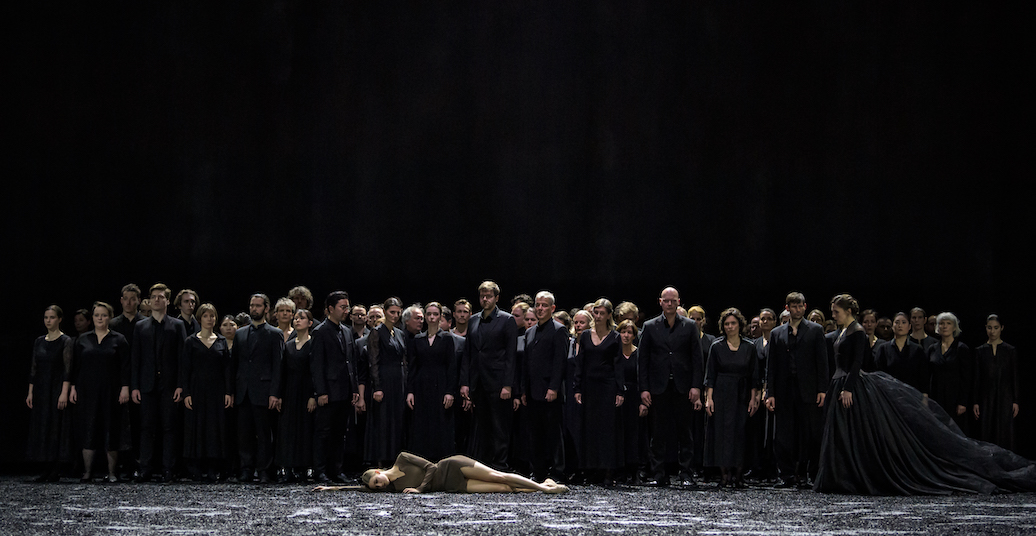“Messa da Requiem” is a 2016 work setting ballet to Verdi’s choral and orchestral score. Choreographer/director Christian Spuck revives the work with the Staatsballett Berlin and Rundfunkchor Berlin, for this premiere on 14 April 2023 at Deutsche Oper.
Messa da Requiem is among the more famous musical works of the western canon. Composed by Verdi largely in 1873 following the death of writer/philosopher Alessandro Manzoni, it is known among aficionados for its theatricality and renegade energy, whereby Verdi takes the polyphonic versions of the Gregorian funeral chant and, at certain points, dramatizes them to absurd intensities.
Christian Spuck’s – seemingly unprecedented – decision to set this as an almost neoclassical ballet occurred during an enlightened burst of inspiration (in the program he states that he first came up with it in an opera magazine, and it received the response “we have to do it!”). But, after extensive tours and resource-heavy stagings over a 7-year period, of which this 100-person extravaganza is the latest, it remains to be seen whether this was a good idea.
The abstract ballet opens with an absence of movement to the first part Requiem aeternum: one dancer still downstage left, another edging across the backdrop of the vacuous stage (designed by Christian Schmidt, as a kind of limbo or between-space), occasionally breaking into slow, high reaching of the arm. To each side, a choir of black-clothed singers form a kind of dramatic cocoon, framing the action like a makeshift human curtain. Both dancers are picked up and spun adagio, in a partnering gesture repeated throughout the work, lifted and carried in circles or slow cambrés in attitude. As the first tenor solo of the score begins, the human curtain folds across the stage, to prepare for the Dies irae – introducing Verdi’s most famous refrain of the Requiem, where two dancers explode frantically out of the earth in a more contemporary burst, bathed in top light (by Martin Gebhardt) and planted among an allegro backdrop of the pleading, gesticulating choir.
The piece moves through different formations, with a quartet of singers juxtaposed against the dancers, often in pairs, who repeat gestures of cascading and accumulation across the black snow-covered floor. The dancers and singers often compete for attention, creating a sort of split focus between side-lit body and the solidity of the vocal protagonist. Some depth eventually develops – and the soprano solo that begins the final section Libera me introduces a series of delicate circular and arc movements, a white-clothed dancer kicks out a leg allongé and is carried centre-stage, reaching as an ensemble of now terracotta-clothed dancers lies in the floor behind.
The urgent murmur of Verdi does not seem to run through the dance – nor does the unwavering technical expression sit well against the inexorable progression of the composition: although Spuck proposes “Messa da Requiem” as 16 tableaux, many seem technically similar, sometimes almost decorative. The translation of the piece into ballet seems a sticking point, and the occasional stage trick — such as a floor dragged around by a dancer’s leg, or the choir madly scribbling jibberish on the back wall for the Agnus Dei — can’t mask the feeling of being somewhat cheated on the level of movement, in favour of a tepid, safe stage spectacle.
It’s hard to see a real depth of engagement in “Messa da Requiem” as a ballet, although this will not stop its rapturous reception in many audiences, repeated at its Deutsche Oper premiere. Despite this, it’s lifeless, static version of death only manages a cursory choreographic articulation of the terror of Verdi’s final judgement, as though content to dwell in awe of the subject, betraying somewhat the relentlessly human power of its source.
“Messa da Requiem” – music by Guiseppe Verdi, choreography by Christian Spuck, with the Staatsballett Berlin, the Rundfunkchor Berlin and the orchestra of Deutsche Oper Berlin – premiered on 14 April 2023 at Deutsche Oper Berlin. Next dates 17 / 29 April, 4 / 6 / 12 May, 2 / 19 / 22 / 27 June 2023, more information and tickets at staatsballett-berlin.de.




